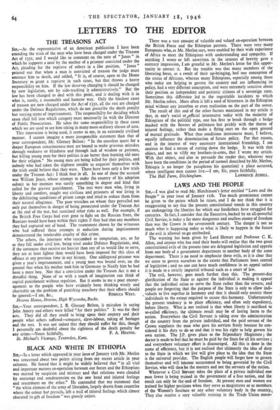THE TREASONS ACT
Sut,—As the representative of an American publication I have been attending the trials of the men who have been charged under the Treason Act of 1351, and I would like to comment on the note of " Janus " in which he supports a note by the mother of a prisoner convicted under the Act, pleading for the reprieve of others in a like position. " Janus " pointed out that when a man is convicted of treason the judge must sentence him to death, and added, "It is, of course, open to the Home Secretary to grant a reprieve in such cases, but that throws a heavy responsibility on him. If the law deserves changing it should be changed by new legislation, not by side-tracking it administratively." But the law has been changed to deal with this point, and is dealing with it in what is, surely, a reasonable and humane way. Only the blackest cases of treason are now charged under the Act of 5351, all the rest are charged under the Defence Regulations, which do not prescribe the death penalty but varying terms of imprisonment. The responsibility for deciding which cases shall fall into which category must necessarily lie with the Director of Public Prosecutions. He takes the same responsibility in these cases which we are used to see him taking in many more ordinary classes of case.
This innovation is being used, it seems to me, in an extremely civilised manner. I cannot imagine a more irresponsible statement than that of your correspondent, Mr. Glomey Bolton: "In the ceaseless quest for a deeper European consciousness men are bound to make grievous mistakes through weakness or blindness and through lack of wisdom or patience, but killing young men for their politics is no better than burning old ones for their religion." No young men are being killed for their politics, and nobody who had taken the slightest trouble to acquaint. themselves with the trials could believe that they were. There have been only a few trials under the Treason Act: I think four in all. In one of these the accused was William Joyce, whose attempt to make the country of his adoption submit to her enemies was surely something in degree and kind that called for the gravest• punishment. The rest were men who, living in liberty and comfort, sought out civilians and prisoners of war living in the debilitating conditions of prison camps and tried to seduce them from their natural allegiance. The poor wretches on whom they prevailed not only put themselves in danger of being prosecuted under the Treason Act at the end of the war, but sustained other risks as well. For example, if the British Free Corps had ever gone to fight on the Russian front, the Russians would have been within their rights if they had shot any members they had captured out of hand. The resentment shown by the witnesses who had suffered these attempts at seduction during imprisonment demonstrated the intolerable cruelty of this crime.
The others, the internees who succumbed to temptation, are, so far as they fall under civil law, being tried under Defence Regulations, and, if the sentences they receive are heavier than any of us would like to serve, they are at least lighter than would have been imposed for this class of offence at any previous time in our history. One ackilepated prisoner was given a year's imprisonment, and a young man was bound over, on the ground that when his mother took him to Germany to Nazify him he had been a mere boy. Not that a conviction under the Treason Act is not a dreadful thing. allone of us with a touch of imagination can think of capital punishment without repulsion. But it seems to me a poor encour- agement to the people who have evidently been thinking wisely and charitably on the problem of punishing treachery that their efforts should
be ignored.—I am, &c., REBECCA WEST. lbstone House, lbstone, High Wycombe, Bucks.
SIR,—Your correspondent, J. R. Glorney Bolton, is mistaken in saying John Amery and others were killed "for their politics." It was for their acts. They did all they could to bring upon their country and their people what others suffered—conquest, slave-labour, taking of hostages and the rest. It was not unjust that they should suffer for this, though I personally am doubtful about the rightness of the death penalty for
any crime.—Yours faithfully, F. A. HEATON. Sr. Michael's Vicarage, Ten terden, Kent.


























 Previous page
Previous page